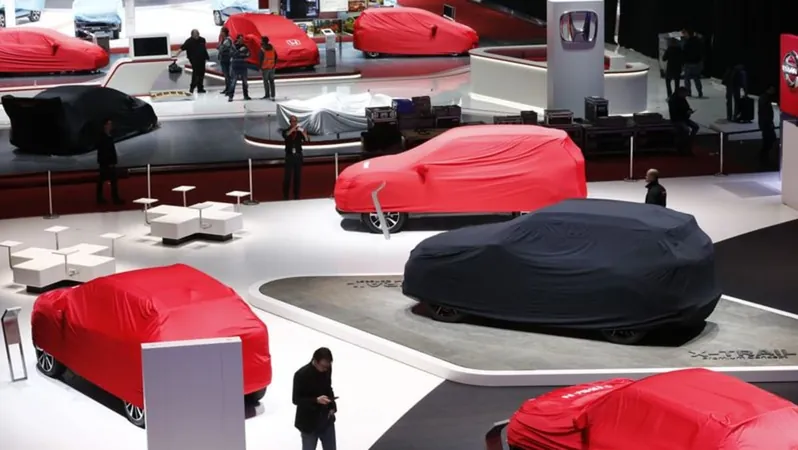
The Honda-Nissan Merger Talks: A Bold Move to Combat Chinese EV Dominance
2024-12-19
Author: Daniel
Introduction
In an electrifying turn of events, Japan's automotive giants Nissan and Honda are engaged in serious discussions regarding a potential merger that could propel them to become the world’s third-largest automaker by volume. With fierce competition from burgeoning Chinese electric vehicle (EV) manufacturers, this alliance is seen as a pivotal strategy to reclaim the global automotive landscape.
The Challenge from China
Japan's automotive industry once dominated the global markets, exporting vehicles from renowned manufacturers like Toyota and Nissan far and wide. However, the 21st century has ushered in an era where China is setting the pace in the EV sector. The realization of how quickly China has risen to the forefront of the EV market is staggering; last year, China accounted for a whopping two-thirds of global EV sales, with over half of the world’s EVs now operating on its roads.
This rapid ascendance was fueled by the Chinese government's massive investment and strategic support, amounting to an estimated US$230 billion since 2009. Coupled with strong consumer adoption, innovation among local manufacturers has outpaced that of their Japanese counterparts.
Japan's Slow Adoption of EVs
One of the core reasons for Japan's slow adoption of EVs lies in its strong preference for petrol-electric hybrids, a technology heavily promoted by market leader Toyota. While hybrid sales in Japan are set to grow until 2027, there has been a general reluctance among Japanese automakers to shift focus towards fully electric vehicles. The lack of substantial government incentives further complicates the landscape, positioning Japanese companies at a disadvantage compared to their international competitors.
Decarbonization Efforts
A recent Greenpeace study has also highlighted that Toyota, Honda, and Nissan rank the lowest in terms of decarbonization efforts among the leading global automakers. Alarmingly, experts warn that Japan's traditional auto manufacturing sector, which constitutes nearly one-fifth of the nation’s exports, could face severe consequences if a swift shift towards EV production does not occur. This could lead to significant GDP decline and job losses in the auto industry.
Strategic Pivot Towards EVs
In response to these challenges, Nissan and Honda are aiming to pivot towards the EV market strategically. The two companies previously agreed to explore a partnership focused on EV production, intending to cut costs and enhance competitiveness. In an ambitious plan, they aim to roll out a new EV by 2030 alongside self-driving software development, with the potential inclusion of Mitsubishi Motors, in which Nissan holds a substantial stake.
Industry Expert Insights
Despite the uphill battle against Chinese innovations in battery technology and car design, industry experts like Vivek Vaidya from Frost & Sullivan express optimism, noting that Japan is not too far behind. He reminds us that the first commercially produced electric vehicle, the Nissan Leaf, was a Japan-made innovation that set the stage for the current EV revolution.
Nissan's Internal Challenges
However, Nissan is grappling with its own set of urgent challenges. Since the arrest of former CEO Carlos Ghosn in 2018, the company has struggled with a stagnant product lineup and disruptive electrification plans. Recent reports indicate a staggering 70% drop in anticipated profits and a $60 million loss from the previous quarter, prompting drastic measures like the recent announcement of 9,000 job cuts.
The Potential Merger
As the merger talks progress, Honda stands to gain a robust EV and battery manufacturing partner in Nissan, while the latter seeks financial stability from Honda’s larger market capitalization. The potential merger could be a game-changer, reminiscent of the US$52 billion Fiat Chrysler and PSA merger that formed Stellantis.
Challenges Ahead
Yet, the road ahead is fraught with challenges. Differing corporate cultures, potential job losses, and an ever-evolving market environment could pose significant hurdles. Vaidya notes that while the brands might continue to exist independently, consolidations at the production and research levels could lead to workforce reductions.
Conclusion
In a market where global consolidation has become imperative, the struggle for survival has never been greater. The challenges that every legacy automaker faces underline the need for innovation and economies of scale.
As this narrative unfolds, the looming question remains: Can Honda and Nissan effectively unite to take on the Chinese EV dominance, or will they find themselves left in the dust of rapidly advancing manufacturers? Stay tuned, as this story continues to develop.


 Brasil (PT)
Brasil (PT)
 Canada (EN)
Canada (EN)
 Chile (ES)
Chile (ES)
 España (ES)
España (ES)
 France (FR)
France (FR)
 Hong Kong (EN)
Hong Kong (EN)
 Italia (IT)
Italia (IT)
 日本 (JA)
日本 (JA)
 Magyarország (HU)
Magyarország (HU)
 Norge (NO)
Norge (NO)
 Polska (PL)
Polska (PL)
 Schweiz (DE)
Schweiz (DE)
 Singapore (EN)
Singapore (EN)
 Sverige (SV)
Sverige (SV)
 Suomi (FI)
Suomi (FI)
 Türkiye (TR)
Türkiye (TR)